Seasoned rocker tells of his Oakland roots, playing with the Sorentinos and his unlikely “day gig”
Exclusive interview with FBPO’s Jon Liebman
April 29, 2013
Rob Ruiz’s definition of rock & roll has always been “two guitars, bass, drums and somebody screaming over it.” Inspired by classic rock bands like the Beatles, the Rolling Stones, Creedence Clearwater Revival and Grand Funk Railroad, Rob toured nationally in the ’70s and early ’80s with Rolls Rock, a power trio based out of Eureka, CA. Rolls Rock opened for acts such as Van Halen, Rick Springfield, Pablo Cruise, Journey and Eddie Money before disbanding in 1982.
After meeting Dan Sorentino in the early ’80s, Rob joined the Chills, who soon changed their name to The Sorentinos. They have continued to deliver their brand of Americana rock & roll to stages in Northern California as well as the UK for over 26 years. The Sorentinos have opened concerts for John Lee Hooker, Dwight Yoakum, Chris Isaak, Peter Frampton, Chicago, Bread, Huey Lewis, Night Ranger, Jeff Beck and Hootie & the Blowfish. Rob has also played bass with Captain Beefheart, Boz Scaggs and Neal Schon.
Rob Ruiz has worked for various parks for over thirty years and currently serves as the Chief Park Ranger of Marin County Parks. He offers public programs on coyotes and mountain lions and collects rock memorabilia.
FBPO: Tell me about your musical upbringing.
RR: I was born in Oakland, California, and grew up over in Concord in the East Bay. My Mom’s record collection was on one of those old record sleeve carousels that went from the floor to the ceiling and included LPs by Keely Smith, Vic Damone, Johnny Mathis, Elvis and Trini Lopez’s Live at PJ’s. My Dad was totally into Frank Sinatra, Al Martino and Louie Prima and not much else. He was a lounge singer and liked the love songs. The Beatles might as well have been Blue Cheer to him. The first time he saw me play with my band Rolls Rock, we were opening for Y & T at the Keystone Berkeley. He came backstage after the show and said, “That was very nice son, but it’s not music.” I told him, “Maybe not, Dad, but the ladies are dancing!” [Laughs]
FBPO: How did you become a bass player?
RR: After listening to my parents tell me how terrible the Beatles and Stones looked and sounded, I figured they were doing something right. I was certainly more interested in songs rather than bass playing, but always just kind of keyed into what Paul McCartney and Bill Wyman were doing. I walked past a music store soon after and they had a white Univox bass and amp on sale for $99. My Mom bought it for me, probably thinking I would play nothing but Johnny Mathis songs. [Laughs]
FBPO: Who were your influences as a young student of bass?
RR: I think my first influence was this kid in high school named Dave Ramos. He had a ’50s cover band with black leather jackets and greased back hair, but what caught my eye was the shiny new Fender Jazz bass with the big old tuning pegs. I instantly wanted a Fender! In college, once I learned to play the bass line to “Foxy Lady,” I figured it was time to join a band.
My other influences were John Paul Jones, James Jamerson and Carol Kaye in the ’60s. In the ’70s I liked Mel Schacher from Grand Funk, Randy Meisner from the Eagles, Boz Burrell from Bad Company, Michael Lutz from Brownsville Station, Peter Cetera from Chicago, Dee Dee Ramone – strictly for entertainment value – and Tom Petersson from Cheap Trick. Joey Spampinato from NRBQ plays great walking bass lines that have always impressed me. I have always dug the groove guys like Leland Sklar and Randy Jackson.
After hearing Jaco, Jeff Berlin and Billy Sheehan, I knew the bass guitar was heading in a direction that was opening up a lot of musical doors. I actually took bass lessons from Andy West from the Dixie Dregs and my old pal Brad Russell. Brad is one of my favorite bassists and can play pretty much any style of music effortlessly.
I consider myself a solid rock & roll bassist and entertainer. My string bass lessons from my college days are a distant memory and my reading skills need work. In fact, Jon, I actually was able to listen and learn the bass lines from your Bass Aerobics CD by playing along with it rather than reading along. If I had to increase my musical education it would probably be to take voice lessons and become a lead singer to lead my own band. When you play original music as I do, it is just not something I feel I need at this stage of my life. My bad!
FBPO: You were with Rolls Rock for quite some time. Tell me about that band.
RR: Rolls Rock was based out of Eureka, California, in the late ’70s. We played original music and covers by the Who, AC/DC or anything that would make people dance and want to drink beer. We were a trio that toured all over the US and Canada and played up to 250 nights a year.
We tightened the band up by playing a club in Juneau, Alaska, for three months, 9:00 p.m. to 5:00 a.m., six nights a week. We’d open a show for Van Halen in an arena for thousands of people in California one night, then play in a bowling alley in Moscow, Idaho, for five people the next. We usually ate our dinner on the road at any bar that served free appetizers. It was hard work but the most exciting time of my life. When bands complain about the rigors of touring, I have to say, “Dude, you don’t set up your own equipment or tune your own guitars and you don’t stay in hotel rooms that cost $29 a night. Cry me a river!”
 FBPO: It sounds like you were pretty well immersed in the rock & roll culture. You must have at least one good story from that period. Maybe a good road story?
FBPO: It sounds like you were pretty well immersed in the rock & roll culture. You must have at least one good story from that period. Maybe a good road story?
RR: I have a few: One time we were backstage in Vancouver, BC, and these guys came to our dressing room after the show and said they played in a band called Loverboy. Our drummer took a hit off his joint and said, “Man, I thought the name of our band was dumb!” Their bassist (Scott Smith, R.I.P.) was a good guy and player. Another time, on his way to the stage in Redding, California, David Lee Roth put his hand on my shoulder and said, “Step aside, lightweight.” Our last gig as Rolls Rock was in Houston, Texas, after certain members’ drug use and the road crew’s antics got on my nerves. Soon afterwards, the wife and I moved to the San Francisco Bay Area and I joined a blues trio called Dana Hubbard and the Delta Twisters.
FBPO: Tell me about the Sorentinos.
RR: Danny Sorentino writes more songs then anyone I have ever known or heard of, at least with lyrics. The four of us, including Howard Vatcher on lead guitar and Rory Judge on drums, have different musical influences, from jazz to country, but all dig the Beatles and Stones. Throw in a little Dylan, Petty, Buddy Holly, Hank Williams, Neil Young & Crazy Horse and what you get is the Sorentinos!
FBPO: Even though you have a “day gig” as a park ranger, how much are you still able to keep up with your music?
RR: I play the bass pretty much every day, even if it’s just trying to cop the bass line from a dumbass reality show! My job can be very stressful at times, so playing the bass is relaxing. I own sixteen bass guitars and five Ampeg amps, so I have too much invested and am still too interested in the instrument to quit.
I was collecting articles on my favorite bassists of all genres long before there were any bass guitar magazines in existence. My main instruments with The Sorentinos are a 1976 Gibson Thunderbird bass – the same bass my grandfather bought me in ’76 that I played with Rolls Rock – a ’74 P bass and a Waterstone 12-string bass. I also own two Hamer 12-strings, Danelecrtos and various Fenders. The Sorentinos only play 2-3 times a month now and we’re currently working on our sixteenth CD.
FBPO: What other musical goals do you have for the future?
RR: I would like to continue to play live shows with The Sorentinos, as well as my side project, The Beer Scouts. I will continue to attend local bass clinics and Bass Player Live! in Hollywood to keep inspired and the calluses and chops up.
FBPO: What’s a typical day like in the life of a Chief Park Ranger?
RR: As Chief Park Ranger of Marin County Parks, I’m in charge of thirty facilities. I get up at 4:30 a.m. five days a week and deal with park permits and reservations, tree risk and safety issues, park maintenance projects, budgets, personnel issues and the ever-popular public complaints.
I do love the outdoors and my job. We try to promote a healthy lifestyle and an awareness of the environment to our public. There have been several music industry folks who have told me over the years, “Man, I wish I had your job.” I just smile and say, “Well damn, I wished I could have played bass on that Metallica song.”
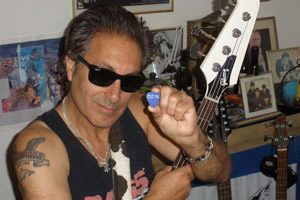
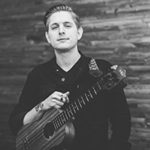
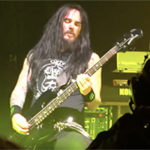
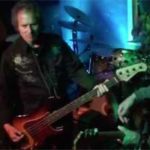
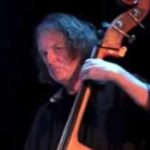
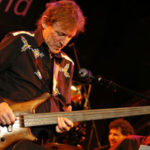
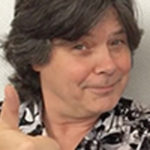

I remember Rob use to come into the automatic rain company back in the middle 80′ and talk bass with me. One of the most mellow down to earth and polite rockers i know. If you’re lucky you can catch him on a good day at Mc Nears in San Rafael.